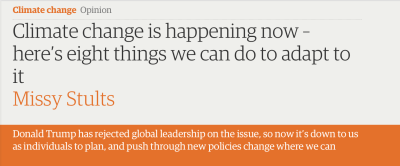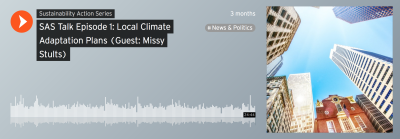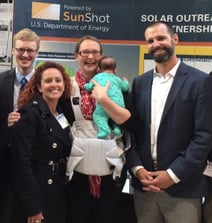 There’s nothing like hopping on to social media to see an empowering headline like “Climate change is happening now -- here’s eight things we can do to adapt to it” and then noticing the byline is one of your most esteemed colleagues. That was my much-needed jolt yesterday when I read the Guardian headline in my Facebook feed posted by the article’s author Missy Stults.
There’s nothing like hopping on to social media to see an empowering headline like “Climate change is happening now -- here’s eight things we can do to adapt to it” and then noticing the byline is one of your most esteemed colleagues. That was my much-needed jolt yesterday when I read the Guardian headline in my Facebook feed posted by the article’s author Missy Stults.
My first SAS Talk podcast interview last year was with none other than Missy. It’s  worth a listen as she gives a good overview of her research findings with specific lessons learned for local governments.
worth a listen as she gives a good overview of her research findings with specific lessons learned for local governments.
I pulled out some of her key recommendations from the podcast in a blog post.
I also encourage you to read Missy’s opinion piece in The Guardian -- and share it far and wide. It offers eight simple, tangible steps that we as individuals and as government leaders can take to start dealing with impacts of climate change. Missy also emphasizes the importance of ‘win-win’ solutions that increase resilience to the impacts of a changing climate, while also reducing greenhouse gas emissions.
I’ll call out two of her ‘win-win’ recommendations from The Guardian piece here that are most relevant to KLA’s local government audience:
#5) Integrate climate change into all policies, programmes, and decision-making processes. We need to ensure that all investments are based on sound science and prepared to endure, regardless of what the future brings. That is why climate change must be factored into all planning and decision-making at local, state, national and international levels.
#7) Embrace green infrastructure. Investing in green spaces, parks, urban forestry, rain gardens, and the like would be an economically smart way of managing storm-water and flooding while also investing in our local communities. Encourage your government to consider green infrastructure with the same fervour usually reserved only for traditional physical infrastructure projects.
What we need right now is leadership. Solutions. Action. So if the strong headwinds in DC threatening to rewind our progress on climate, sustainability and clean energy get a bit too intense for you, remember that there are people like Missy out there --- and that there are steps we can take in our personal and professional lives to keep the positive momentum going.




